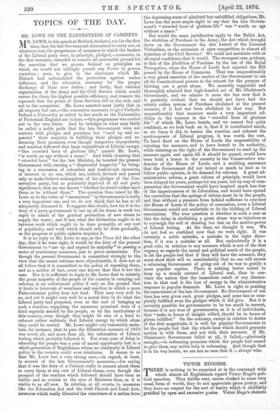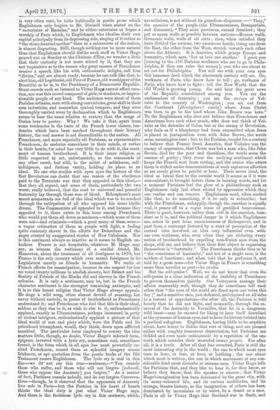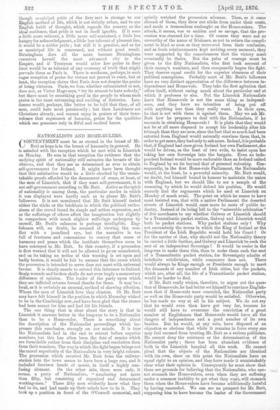VICTOR HUGOISM. T HERE is nothing to be surprised at in
the contempt with which almost all Englishmen regard Victor Hugo's poli- tical speeches. They dislike rant, unless cloaked in some very usual form of words, they do not appreciate prose poetry, and they have no respect for the sort of vanity which is childishly gratified by open and excessive praise. Victor Hugo's rhetoric is very often rant, he talks habitually in poetic prose which Englishmen only forgive to Mr. Disraeli when seated on the "mountains of Rasselas," and he either entertains or feigns a worship of Paris which, to Englishmen who idealise their own capital principally from its depressing side, singing of it rather as "the stony-hearted mother" than as a microcosm of the nation, is almost disgusting. Still, though nothing can be more natural than that Englishmen should dislike such stuff as Victor Hugo poured out on Sunday at the Château d'Eau, we wonder a little that their curiosity is not more stirred by it, that they are not inquisitive as to the reason why great masses of Frenchmen receive a speech like his with enthusiastic delight, call him "divine," and are almost ready, because he can talk like that, to elect him, old Legitimist, old Peer of France, old worshipper of the Beautiful as he is, to the Presidency of a Democratic Republic. Great crowds such as listened to Victor Hugo cannot affect emo- tion, nor was this crowd composed of girls, or students, or impres- sionable people of any kind. The audience were most of them Parisian artisans, men with strong convictions, great skill in their own industries, and somewhat cynical tempers, and they were thoroughly carried away by declamation which to Englishmen seems to bear the same relation to oratory that the songs of Ossian bear to poetry. Why ? We take it that, apart from some tendencies in the taste of the French lower classes, ten- dencies which have been marked throughout their literary history, the real answer is not discreditable to the nation. All Frenchmen, and more especially all Parisians, as representative Frenchmen, do enshrine somewhere in their minds, or rather in their hearts, for mind has very little to do with it, the senti- ment of human brotherhood. It is their inner religion, as little respected in act, unfortunately, as the commands of any other creed, but still, in the midst of selfishness, self- indulgence, and furious vanity, holding its place as an ideal. No one who studies with open eyes the history of the first Revolution can doubt that one reason of the obedience paid to the Terrorists was that they appealed to this ideal,— that they all argued, and some of them, particularly the two worst, really believed, that the road to universal and peaceful fraternity lay through those seas of blood. Robespierre's most secret memoranda are full of the ideal which was to be reached through the extirpation of all who opposed his inner idyllic dream. The Communists all appealed to it, and because they appealed to it, there exists to this hour among Frenchmen who would put them all down as madmen—which some of them were not—and criminals—which a good many of them were— a vague estimation of them as people with light, a feeling quite curiously shown in the efforts for Delescluze and the anger created by exaggerated stories of New Caledonia. Nor is this sentiment always so inactive as it seems to English on- lookers. France is not hospitable, whatever M. Hugo may say, as witness the testimony of a cordial friend, Mr. Hamerton, about the treatment of all foreigners in 1870, but France is the only country which ever seated foreigners in its Legislature merely as friends to humanity. We smile at French efforts for emancipation, because in our respect for law we voted twenty millions to abolish slavery, but Brissot and his Society of Friends of the Blacks did end slavery in the French colonies. It is only a sentiment, may be, but in the French character sentiment is the strongest remaining antiseptic, and it is to this latent religion that Victor Hugo always appeals. He sings a wild song, often almost devoid of meaning, but never without melody, in praise of brotherhood as Frenchmen understand it; and Frenchmen who feel that this is their ideal, seldom as they rise to it, or wish to rise to it, enthusiastically applaud, exactly as lIltramontanes, perhaps immersed in petty or violent intrigues, enthusiastically applaud a picture of that ideal world of rest and piety which, were the Faith and its priesthood triumphant, would, they think, dawn upon afflicted mankind. The particular form employed to convey the idea matters little, though, no doubt, Victor Hugo's selected form, epigram invested with a lyric cry, sometimes real, sometimes forced, is the form which in all ages has most powerfully ex- cited Frenchmen, roused them as splendid imagery rouses Irishmen, or apt quotation from the poetic books of the Old Testament rouses Englishmen. The lyric cry is real in this fine—we dr not say this true—sentence,--" You console those who suffer, and those who will not forgive [subaudi, those who oppose the Amnesty] you forgive." As a matter of fact, Parisians console nobody, and do not forgive Conserva- tives—though, be it observed that the opponents of Amnesty live safe in Paris—but the Parisian in his heart of hearts thinks the ideal duty is just what Victor Hugo says. And there is the factitious lyric cry in this sentence, which, nevertheless, is not without its grandiose eloquence :—" They," the enemies of the people (the Ultramontanes, Bonapartists, and Germans), " They seize provinces, extend frontiers ; they put as many walls as possible between nations—Roman walls, Germanic walls, walls of all sorts ; then, when satisfied they have divided the nations, two enormous hands, rising one from the East, the other from the West, stretch towards each other above the Atlantic. It is America, which grasps Europe and humanity, which says, Let us love one another.' I greet you [turning to the 150 Parisian workmen who are to go to Phila- delphia, if they can raise the money], you who are about to set out for Philadelphia. You will see with your own eyes this immense deed which the nineteenth century will see. Go, workmen of Paris, who know how to toil ; go, workmen of Paris, who know how to fight ; tell the New World that the Old World is growing young. Go and bear the great news of the Republic consolidated among you. You are the ambassadors of fraternity ; you are the envoys of Vol- taire to the country of Washington ; you set out from the Continent [Hemisphere? surely] where Jesus Christ was born to go to the land where John Brown was born." To the Englishman who does not believe that Frenchmen and Americans love each other much, who does not think of Vol- taire as the defender of Calas, but as the enemy of Revelation, who feels as if a blasphemy had been committed when Jesus is placed in juxtaposition even with John Brown, the words seem meaningless rant ; but to the Parisian, taught for a century to believe that France freed America, that Voltaire was the enemy of oppression, that Christ was but a man who, like John Brown, died for the poor and thankless, the words seem the essence of poetry ; they rouse the undying sentiment which keeps the French soul from rotting, and the orator who utters them is stifled under demonstrations of such rapturous affection as are rarely given to patriot or hero. Their secret ideal, the ideal so latent that to the outside world it seems as if it were non-existent, is brought before them in burning words, and for a moment Parisians feel the glow of a philanthropy such as Englishmen only feel when stirred by oppression which they can realise and can remove. Englishmen need, when excited like that, to do something, if it be only to subscribe ; but with the Frenchman, unhappily, though the emotion is equally real, it passes off in a vague sense of gratified benevolence. There is good, however, rather than evil in the emotion, tran- sient as it is, and the political danger in it which Englishmen see, arises in part from reminiscences of Robespierre, and in part from a contempt fostered by a want of perception of the central idea involved, an idea very influential even with our own workmen, who, even when they are violating every notion of brotherhood by expelling non-Union men from the shops, still say and believe that their first object in organising themselves is " fraternity." The Frenchman thinks that to be " the conscience of humanity," and not of a single race, is the noblest of functions ; and when told that he performs it, and told by a great man—for Victor Hugo in France is something more than novelist or poet—he exults.
But the self-praise ? Well, we do not know that even the self-praise is a clear indication of the inability of Frenchmen to govern themselves quietly. Our Vestrymen manage their affairs reasonably well, though they do sometimes tell each other that "the eyes of the world are fixed upon our votes this day ;" and a sensitive race, just defeated, and exposed on all sides to a torrent of opprobrium—for after all, the Parisian is told hourly that he did not fight, and momently, through the re- moval of the Assembly to Versailles, that he is a dangerous wild beast—may be excused for liking to hear itself described as the cynosure of human eyes, and to have its history twisted into a poetical eulogium. Englishmen, having little to be sensitive about, have learnt to dislike that sort of thing, and are pleased rather with roughly humorous depreciation, but Parisians are tickled and even made enthusiastic by a repetition of the one truth which consoles their wounded amour propre. For after all, it is a truth. After all that has occurred, Paris is still the most interesting city in the world ; the one to which most eyes turn in hate, or fear, or love, or loathing ; the one about which most is written, the one in which movement of any con- siderable kind most disturbs or arouses men. Victor Hugo tells the Parisians that, and they like to hear it, for they know, or believe they know, that the speaker is sincere ; that Victor Hugo's imagination has been dominated by the great city, with its many-coloured life, and its various multitudes, and its strange, bizarre history, as the imagination of others has been dominated by mountains or by water, by a desert or a race. Paris is all to Victor Hugo that Scotland was to Scott, and though municipal pride of the fiery sort is strange to our English method of life, which is not strictly urban, and to our English habit of thought, which regards the country as the ideal residence, that pride is not in itself ignoble. If it were a little more reticent, a little more self-contained, a little less hungry for acknowledgment, a little less tolerant of pleasant lies, it would be a nobler pride ; but still it is genuine, and as far as municipal life is concerned, not without good result. Birmingham does all the more because Birmingham conceives herself the most advanced city in the Empire, and if Tennyson would utter her praise in fiery lines would be as tolerant of any economy of truth that might pervade them as Paris is. There is weakness, perhaps, in such eager reception of praise for virtues not proved to exist, but at least, the reception shows that Paris does not despise the praise of being virtuous. Paris, we fear, whether calumniated or not, does not, as Victor Hugo says, " try its utmost to hate nobody," but there must be something good in the people to whom such praise is the most entrancing and exciting of flatteries. Lon- doners would, perhaps, like better to be told that they, of all men, could hate most persistently ; but then Londoners are Christians already, and cannot enjoy in praises of their bene- volence that supremest of luxuries, praise for the qualities which one possesses only in fitful and exalted hours.
































 Previous page
Previous page